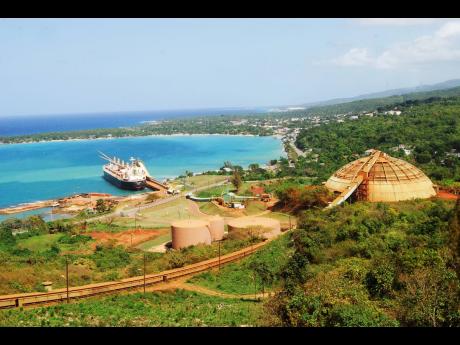Theresa Rodriguez-Moodie | The bauxite-alumina industry – legacy and lessons to be learnt
Growing up in St Andrew, my exposure to the bauxite-alumina industry was the view of the mud lake visible from Mount Diablo on the way to the north coast. As a young university graduate interested in environmental matters, I recall listening to residents in community meetings speak of countless health issues and skin diseases endured because of their proximity to those mud lakes in Ewarton.
Those stories, while distressing, did little to prepare me for my visit to Gibraltar, St Ann, in October 2021. I had recently joined the staff of Jamaica Environment Trust (JET) as the new CEO and sought a better understanding of bauxite mining impacts. Driving through the area, seeing the devastation, the dust, the massive deep pits with houses almost on the edge, left me angry. As I listened to community members recount experiences, health issues, the fight to stop mining, their ignored cries, I felt the outrage. Was mining really worth it? Could anyone believe this devastation was acceptable? These rural communities were being treated with so little regard. What would it be like if those in power actually lived in these communities?
FINDINGS OF THE RED DIRT STUDY
Over the last few weeks, The Sunday Gleaner has published a series of articles by the authors of RED DIRT: A Multidisciplinary Review of the Bauxite-Alumina Industry in Jamaica commissioned by JET in 2019 after decades of reports of environmental and public health impacts caused by the industry. The authors raised several important issues surrounding this 70-year-old industry and as a wrap-up to these articles, I highlight the main findings of RED DIRT:
• There is a lack of transparency. The public seeking information on the bauxite-alumina industry faces formidable obstacles, due to barriers to access data and the absence of important data.
• The regulatory framework (including the Air Quality Regulations) is inadequate. The current regulations do not include the smallest atmospheric particulates (called PM2.5.) generated by mining and processing, which are known to impact respiratory health. This lack of enforcement of environmental laws remains a problem but is not unique to this industry.
• The health impacts of the bauxite-alumina industry are significant. The industry generates large amounts of dust (PM10 and PM2.5) and exposure to these small particles can cause emphysema, pneumonia, cancer, acute respiratory distress syndrome, pulmonary oedema and asthma. Other air pollutants, such as sulphur dioxide cause corrosion of building materials, including ‘zinc’ roofs, soiling of personal property (such as clothes hung out to dry) and damage to crops and vegetation.
Community complaints regarding dust began early in the industry but produced little change in lived experiences. Despite complaints, only one public health impact study was conducted in 2008 by the Government of Jamaica (GOJ) and not for the entire industry, meaning it only covered areas in and around factories and not for extraction points and haul roads.
• The many harmful social impacts include forced relocation of communities, low compensation, loss of farming livelihoods and inadequate rehabilitation of mined-out pits.
• The social costs of the industry are far greater than the economic benefits. Simply put, economic gains from the industry are not worth the environmental destruction and health impacts on communities. The social costs and their harmful effects have been known for decades yet little effort has been made to address these issues.
• Bauxite mining in Jamaica has left a legacy of incalculable environmental abuse and degradation of the island’s ecological heritage. There is much more to learn about the impact on water resources.
Interestingly, the RED DIRT study was shared with at least five state agencies and six ministries at various stages of the process and met with no substantive response.
DEVELOPMENT SHOULD NOT COME AT ANY COST
Jamaica is already experiencing the effects of the global climate crisis and cannot continue with the business-as-usual approach. Recently, there has been debate over the future of the industry. The COVID-19 pandemic has ravaged the Jamaican economy forcing the GOJ to explore ways to increase economic gains quickly. Too often, however, the destruction of the environment and social impacts on communities are accepted as necessary side effects for economic development.
On March 20, The Gleaner editorial stated: “Mining the remainder of Jamaica’s bauxite reserves can’t happen without some impact on communities. The issue is to mitigate the worst of these effects and for the companies to be responsible partners with communities…” How many of us would accept this inherently unequal partnership? What is the rationale for supporting an industry whose costs exceed its benefits to Jamaica?
All Jamaicans have a constitutional right ‘to enjoy a healthy and productive environment, free from the threat of injury or damage from environmental abuse and degradation of the ecological heritage’ (2011 Charter of Fundamental Rights and Freedom). There is an inseparable link between human rights and the environment. Given the requirements of our constitution, public health and environmental integrity cannot be sacrificed for economic development. “If we cannot sustain the environment, we cannot sustain ourselves” (Wangari Maathai, Nobel laureate, 2004).
The bauxite-alumina industry produces high carbon emissions, is a driver of deforestation, compromises food security, rural livelihoods and community cohesiveness, imposes high social and public health costs and poses an unassessed risk to underground water resources. Is it not long past time to develop an urgent transition plan out of an industry that does not meet any definition of sustainability or the requirements for resilience due to the climate crisis?
To access the RED DIRT, visit: https://www.jamentrust.org/
- Theresa Rodriguez-Moodie, PhD, is an environmental scientist and CEO of the Jamaica Environment Trust. Send feedback to jamaicaenvironmenttrust@gmail.com or columns@gleanerjm.com


